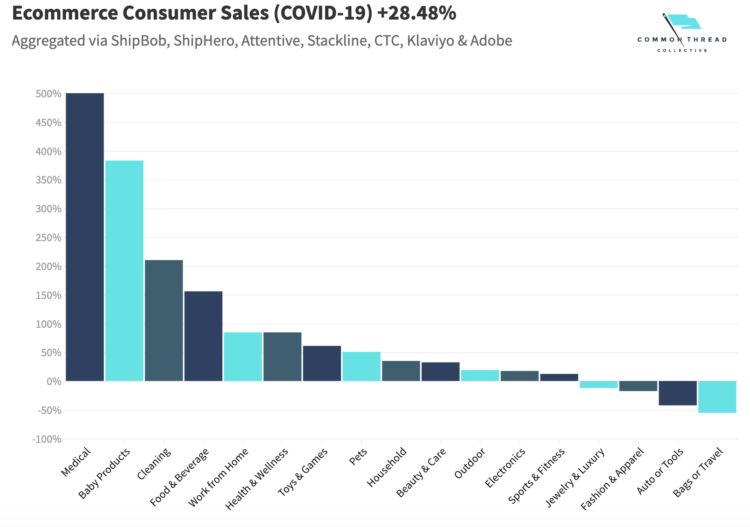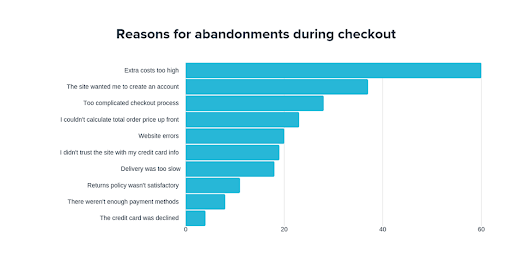Not everything, but nearly everything has been affected and changed by the coronavirus pandemic. The world is at halt, and so are most of the businesses around the globe, except a few that deal in services related to healthcare and food.
However, with everything else shut down, ecommerce stores are still up and running, and most businesses are relying on their ecommerce sales while they try to get through the uncertain times.
So, if you want to sustain your growth even during the pandemic, it’s best to focus on your ecommerce strategy and adapt for your online shoppers’ new priorities.
Read on to find out how!
And in case you still don’t have an online store, we’d recommend you to invest in the best ecommerce solution before it’s too late!

How has the Ecommerce Landscape Changed?
Ecommerce has proved to be pretty essential during the times of social distancing and lockdown. But, since unemployment is increasing rapidly, most consumers have resorted to cutting out unnecessary spending in order to stay afloat as the waves of financial crisis hit them.
As per recent studies and according to what experts say, ecommerce sales have increased for some industries, while others are facing a huge decline depending on the changing behaviour of shoppers.
Here are some recent ecommerce trends that we’ve seen so far:
1. Increase in Online Shoppers
Although most brick and mortar businesses are temporarily closed, customers have not stopped purchasing products altogether, and since they can’t go out, ecommerce is in a pretty good spot!
Wondering how much have ecommerce sales actually increased?
Here are some recent stats related to the impact of COVID-19 on online shopping:

2. Ecommerce Delivery and Supply Chain Issues
Considering the fact that there’s an increase in demand, a lot of business owners are concerned that their regular supply won’t be able to meet it.
Due to disruptions to the supply chain, the availability of products in inventory and delivery times have been impacted largely.
Hence, even though growing during the uncertain times, ecommerce businesses are facing product shortages and other various challenges in terms of fulfilment of online orders.
3. Pause in Ecommerce Operations
Numerous ecommerce stores have halted online orders for non-essential supplies, such as products related to beauty, apparel, home décor, etc.
The reason behind the suspension of ecommerce operations is tighter Government measures in a lot of countries, and the efforts to keep coronavirus from spreading.
4. Diversification of Online Stores
In order to stay competitive in the rapidly changing shopping landscape, ecommerce sellers are adding various corona-related products in their online stores, such as sanitizers, masks, soaps, safety kits, and other items for protection.
In order to stay competitive in the rapidly changing shopping landscape, ecommerce sellers are adding various corona-related products in their online stores, such as sanitizers, masks, soaps, safety kits, and other items for protection.
5. Increase in Online Grocery Shopping
All of us agree that grocery shopping and social distancing don’t go hand in hand unless you’re doing it online.
Moreover, with grocery stores facing the shortage of supplies, a huge number of consumers have resorted to getting essentials delivered to their doorstep, without them having to face any hassle or risk their lives by going out.
Selling Online During COVID-19 – Adapt to the ‘New Normal’
The outbreak of COVID-19 has changed our lives and ways of living to a great extent. While consumers are practicing social distancing, businesses have been left with no option other than selling their products online.
So, if you’re experiencing a negative impact on your sales, here are six tips on how to adapt your ecommerce strategy in the COVID struck world:
1. Keep a Check on Your Supply Chain
As we’ve discussed above, consumer behaviour has changed a lot, and there are chances that you may see an increase in demand on your online stores, or things may remain the same.
However, in either case, keeping in contact with your manufacturers and ensuring that supply doesn’t become an issue is utmost necessary.
Talk to your manufacturers and suppliers to find out about their position during the coronavirus crisis, and if production has been affected by the current pandemic.
In a sense, it’s best to stay informed about all the aspects that may affect your supply chain. Also, you need to plan for the future ahead in case things get worse.
2. Consider Alternative Providers
When it comes to planning for the future, your supply is what must concern you before anything else.
As coronavirus spreads its footprints in countries all over the globe, issues regarding production and supply are making their horrifying appearance, resulting in inventory shortages for numerous sellers.
That’s why, having alternate suppliers and a few different options can help you mitigate the risk and get through these uncertain times.
3. Evaluate Your Customers’ Needs
Once you’ve made sure that your supply is in good standing, it’s time to think about your target audience and perspective customers.
Consider what kind of situation they’re in. For instance, are they working from home or serving as front-liners? What are their major concerns during the pandemic? What sorts of products and services do they need the most?
Evaluating and understanding your customers’ needs is important if you want to be ready to meet them. Because, after you know what your customers want, you’d be able to serve them right and earn profit even during a global financial meltdown.
Need an example?
Well, consider this that numerous companies have added products like sanitizers and facemasks in their product line.
4. Target the ‘At-Home’ Audience
One of the most obvious effects of COVID-19 is that people are spending more time within their homes than usual. With nothing much to do and nowhere to go, your audience is stuck at home, and certainly bored, even depressed to some extent.
So, while you’re evaluating your customers’ needs, think about the changes that you can make in your strategy to help serve your customers better and cheer them up.
For example, with closed dine-in services, restaurants are targeting their at-home audience by offering home-deliveries, drive-through, and curbside pickup.
5. Consider New Sales Channels
Considering the huge decrease in foot traffic for brick-and-mortar businesses due to lockdown and shop closures, most store owners are shifting from bricks to clicks.
In a sense, while the situation prevails, your best bet could be investing in an ecommerce solution if you don’t have an online store by now.
However, in case you’re already selling online but are unable to generate revenue, it’s time to get your ecommerce site optimized for SEO by certified experts.
Apart from this, you can also consider other ways of attracting more audience and making more sales online, such as content marketing, social media marketing, and Google Ads.
Also, to ensure that your visitors convert to buyers, consider securing your ecommerce site with an SSL certificate. And if you’re planning on getting more traffic, make sure that your site is hosted by one of the best web hosting providers.
6. Increase Your Special Discount Offers
The whole world is undergoing an economic crisis, and there are chances that your customers are suffering too.
Want to keep your sales running? Make things easier for your buyers!
In other words, if you can, it’s the right time to introduce some special discounts on specific items.
Plus, you may also want to offer a free home delivery to increase your conversion rate. Check out these reasons for cart abandonment and think about ways of improving customer experience on your ecommerce store.

All in all, don’t be afraid to get creative and think outside the box to meet your customers’ needs while they’re stuck within their homes. Offer discounts, start a loyalty program, and find ways to encourage your customers to keep your ecommerce store running like a swiss watch!

Qurat Ul Ain is the star at Websouls when it comes to ecommerce and digital marketing. She's been doing this for over 7 years and always adds a bit of fun to her projects. Her smart tricks and easy-going vibe make online stuff shine. She's the team's go-to for making things pop online! Follow her on LinkedIn.
 PKR (Rs)
PKR (Rs)
 USD ($)
USD ($)
